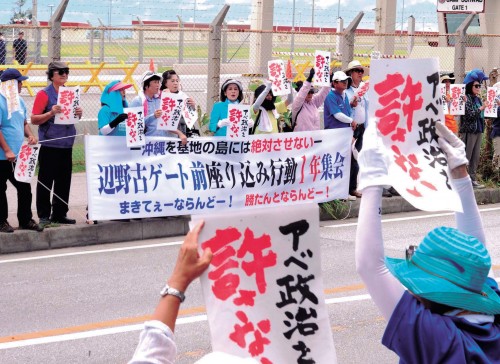Protest action against Abe administration in front of Camp Schwab

Protesters wave matching signs, "We will not tolerate Abe's politics," in front of Camp Schwab at Henoko, Nago, 1:00 p.m. on July 18.
July 19, 2015 Ryukyu Shimpo
A rally titled “Henoko Action to create Okinawa’s future” was held on July 18 in front of Camp Schwab at Henoko, Nago. There, the Governments of Japan and the United States are advancing with the project to build a new U.S. base there to replace U.S. Marine Corp Air Station Futenma in Ginowan. The action marked one year since a sit-in protest started in front of the gate of Camp Schwab.
About 500 people took part. They protested against the Abe administration, which is going ahead with construction of the new U.S. base and has rammed controversial security bills through a special committee of the Lower House.
The participants raised their voices saying, “We should not allow the Abe administration’s heavy-handed approach.”
The rally in Henoko was part of a wave of protest action across Japan against the government, with citizens declaring the same message – “We will not tolerate Abe’s politics.”
Novelist Hisae Sawachi called for a nationwide protest against the Abe administration, which kicked off at 1:00 p.m. on July 18. Many intellectuals, including Buddhist-monk novelist Jakucho Setouchi and journalist Shuntaro Torikoshi, also supported this action.
In front of the gate of Camp Schwab, about 300 citizens hoisted the same sign boards as those being held around the country. At Takae in Higashi, where construction of new U.S. military helipads is being carried out, protesters also took part.
Nago Mayor Susumu Inamine took part in the sit-in protest in front of the gate of Camp Schwab.
“If we allow the security bills for Japan to exercise the right of collective self-defense to be enacted, Okinawa will become a base for launching attacks, for both the militaries of Japan and the United States,” the mayor pointed out.
He added, “Vietnamese people called Okinawa ‘Devil Island’ during the Vietnam War. We would not like to be called the Devil Island again. Let’s block the new U.S. base’s construction because we do not want to stand on the side of the perpetrators.”
Fifty-one year old Urasoe resident Noriko Chinen is angered by the security bills being forced through the Lower House. “The Japanese government steamrolled the bills through the Lower House with a dishonest explanation or just plain stupid justification. This kind of political approach should not be allowed. Both the issue of the security bills and the construction of the new U.S. base in Henoko are important because they may become life-threatening,” she said.
(English translation by T&CT)
Previous Article:Okinawa Governor Onaga to address UN
Next Article:Memorial service held for Okinawan immigrants killed in Davao during World War II
[Similar Articles]
- Stand off between citizens and police officers at gate of Camp Schwab in Nago
- Sit-in protest in front of Camp Schwab marks its first year, reaches critical stage
- Sit-in protester against new U.S. base in Henoko arrested
- 350 people protest Futenma Replacement Facility as Camp Schwab sit-ins enter sixth year
- Sit-in protest in front of Camp Schwab marks its second year
 Webcam(Kokusai Street)
Webcam(Kokusai Street)


